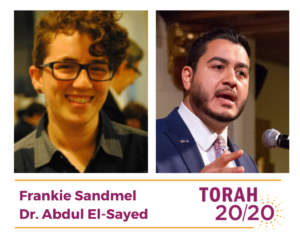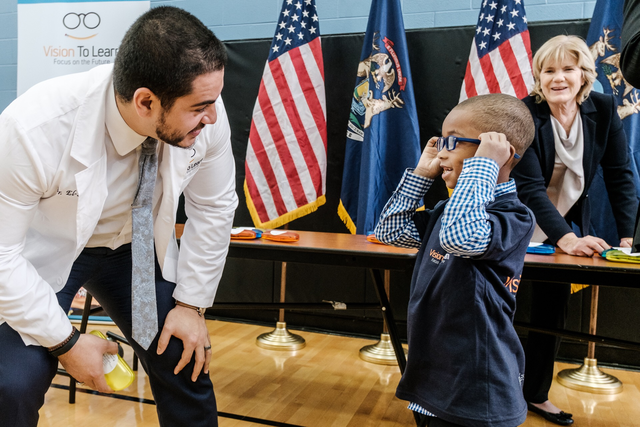A d’var Torah for Pesach by T’ruah rabbinic intern Frankie Sandmel and Dr. Abdul El-Sayed. This d’var Torah is based on Dr. El-Sayed’s remarks on the T’ruah webinar on March 18, 2020.
The COVID-19 pandemic will, without doubt, be at the center of all our Passovers. No matter how you mark the holiday, the impact will loom large. This pandemic, among many other things, is giving each of us a very visceral experience of “narrowness” – of Egypt (in Hebrew Mitzrayim, the narrow places) – to think about as we tell the story of moving from narrowness into openness isolated in our own homes, surrounded only by those absolutely closest to us.
And, as we wrestle with the COVID-19 pandemic this Passover it’s important that we recognize its larger context. For the past several decades, we in the US have been suffering a far slower moving and harder to discern epidemic – the epidemic of insecurity. Now COVID-19 is laying bare the full social and economic consequences of a set of systems that has left people bereft of the capacity to live a dignified life.
Sign up to receive Torah 20/20 in your inbox each week.
We have a housing system that gives more money to subsidizing home ownership for people earning $100,000 a year than keeping low-income folks in their rented homes. We have a healthcare system where ten percent don’t have health insurance at all and another fifty percent have their health insurance behind a deductible paywall. We have an economic system where people are forced to work gigs rather than jobs that provide benefits and comfortable retirements, where corporations take a large part of the value that people create. Or it’s a system of corporate politics where corporations have the rights of people but people don’t have the rights of people, to vote or engage in the political process. All of these things interlocking together have created a house of cards, and we have the wind blowing now and we’re seeing what’s happening. Already there are estimates that unemployment could approach, or even exceed, its Great Depression level (when unemployment peaked at 24.9%).
Each year, our directive on Passover is to feel ourselves on the journey from slavery to freedom, as if we ourselves journeyed with our ancestors out of Egypt. This year, with the ways our society is not yet liberated laid bare by the pandemic, the need for sweeping change is glaring. This year, from our uniquely narrow position, we also have a uniquely broad sense of what liberation could mean.
We have to think about the big structural implications of how to build a society that is robust to these kinds of shocks. If everybody approaches the crisis and tackles it and then goes back to normal, it simply puts us back in the position of being vulnerable to these kinds of crises again. And this will certainly not be the last global pandemic. We don’t want to go back to a normal where people live on the ragged edge of our society, clinging on for dear life — in fact, there’s no going “back” about it; we want to go forward to a new normal where people are fully fortified and invested in. The hard part of crises like this is that we’re a lot closer to the normal we were in than the normal we want to build. Embracing the fact that the future will look different allows us the space to articulate what the different future ought to look like.
Find more commentaries on Pesach
We are reminded of Moses’ constant struggle with the Israelites. God paints Moses a liberatory scene of Israel triumphantly leaving Egypt, complete with a redistribution of Egypt’s wealth — “I will dispose the Egyptians favorably towards this people, so that when you leave, you will not go away empty-handed” (Exodus 3:21) — and Moses’ first concern is how to bring his own people along with him on the journey, how to make sure that they, too, are willing to fight for what could be possible if they leave Egypt. “What if they do not believe me and do not listen to me?” he worries (Exodus 4:1). Even after they are finally freed, as they make the long trip towards the Promised Land, the Israelites struggle to hold onto their bold hope for liberation, longing for some imagined comfort in Egypt and complaining about the food (Exodus 16:3, Numbers 11:20).
 Just as the Israelites needed to hold onto the possibility of freedom and not succumb to complacency, so too we must work to hold onto the broad possibility – and need – for change that this pandemic is exposing. This Passover, we cannot be lulled into a false sense of security, or a nostalgic idea of the past. While our yearning, moment to moment, might be for the simple, uncomplicated freedom of a potluck with neighbors, or a handshake, the crisis is broadly exposing the deep rifts around us and begging us to build a whole new world.
Just as the Israelites needed to hold onto the possibility of freedom and not succumb to complacency, so too we must work to hold onto the broad possibility – and need – for change that this pandemic is exposing. This Passover, we cannot be lulled into a false sense of security, or a nostalgic idea of the past. While our yearning, moment to moment, might be for the simple, uncomplicated freedom of a potluck with neighbors, or a handshake, the crisis is broadly exposing the deep rifts around us and begging us to build a whole new world.
Frankie Sandmel is a rabbinical student at Hebrew College. This semester, they are interning at T’ruah as the Rabbinic Organizing Intern in the Bay Area.
Dr. Abdul El-Sayed is a physician, epidemiologist, public health expert, and progressive activist. He is a former Michigan gubernatorial candidate, health commissioner of Detroit, and professor at Columbia University’s Department of Epidemiology.

